Ethics in Nursing: Addressing Equitable Access to Care in Australia
VerifiedAdded on 2022/10/11
|10
|1552
|16
Report
AI Summary
This report, focusing on ethics in nursing, examines the concept of equitable access to healthcare in Australia. It highlights the disparities faced by Aboriginal Australians and Torres Strait Islanders due to cultural, economic, and environmental factors. The report discusses the role of healthcare managers in addressing these inequities, including the importance of culturally sensitive communication and the implementation of programs to enhance understanding. It also analyzes the impact of government initiatives like the Pharmaceutical Benefits Scheme, while acknowledging that inequalities persist, particularly in rural and remote areas. The report emphasizes the need for healthcare systems to be linguistically and culturally inclusive, offering recommendations for managers to improve access to care, such as providing additional healthcare resources in rural and remote areas and ensuring appropriate training for healthcare staff. A commitment to embracing cultural diversity within healthcare settings is also highlighted as a crucial step toward achieving equitable access for all Australians.
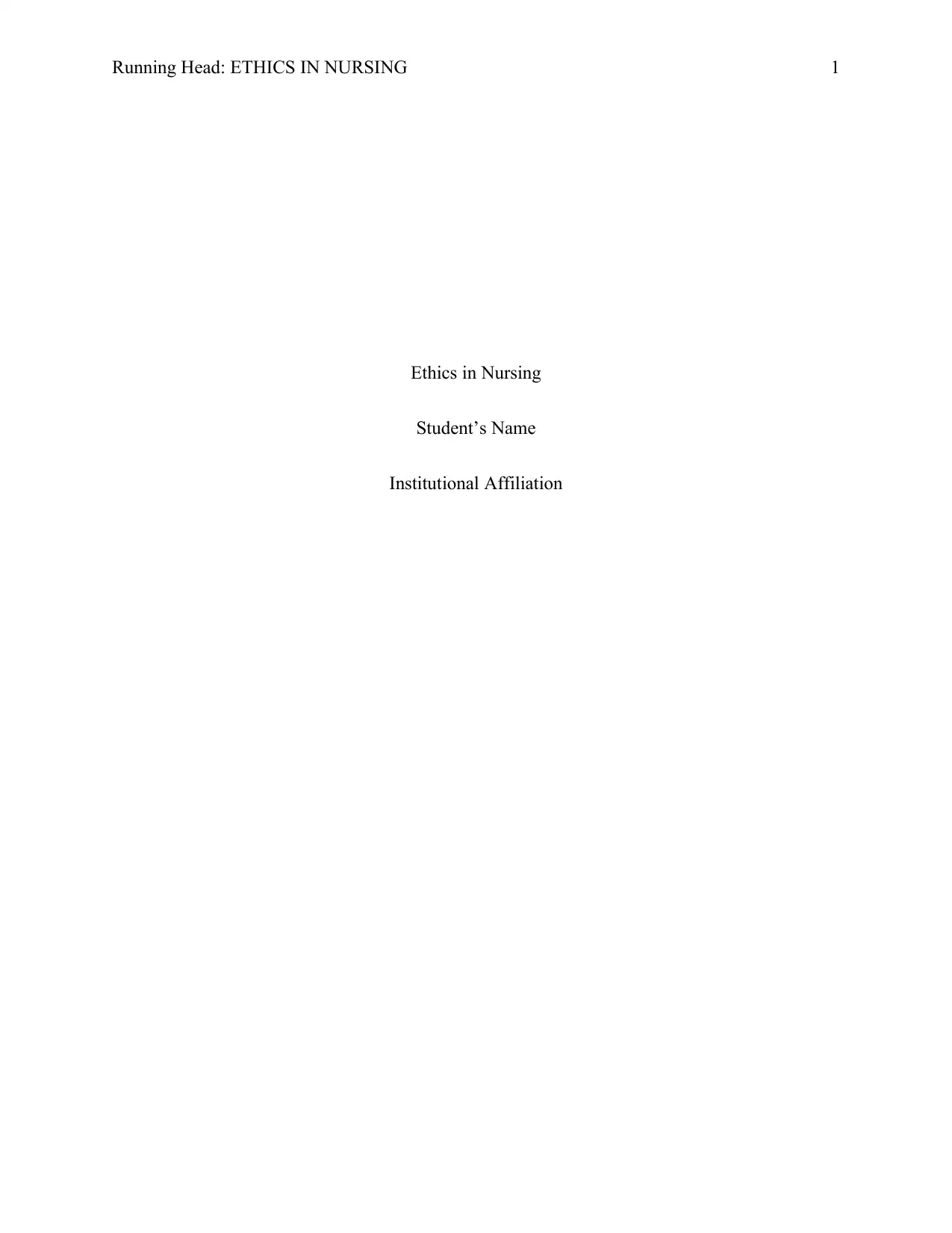
Running Head: ETHICS IN NURSING 1
Ethics in Nursing
Student’s Name
Institutional Affiliation
Ethics in Nursing
Student’s Name
Institutional Affiliation
Paraphrase This Document
Need a fresh take? Get an instant paraphrase of this document with our AI Paraphraser
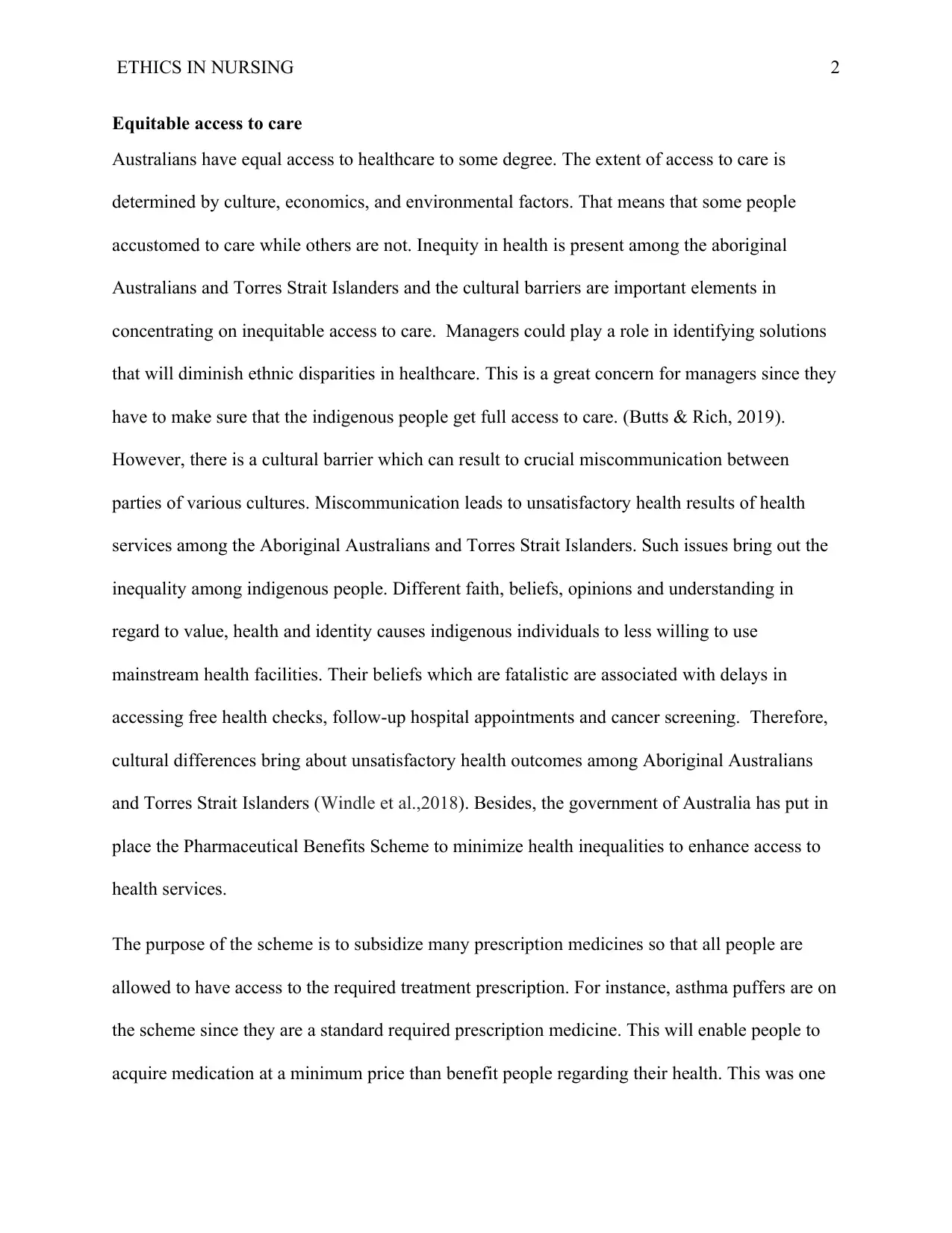
ETHICS IN NURSING 2
Equitable access to care
Australians have equal access to healthcare to some degree. The extent of access to care is
determined by culture, economics, and environmental factors. That means that some people
accustomed to care while others are not. Inequity in health is present among the aboriginal
Australians and Torres Strait Islanders and the cultural barriers are important elements in
concentrating on inequitable access to care. Managers could play a role in identifying solutions
that will diminish ethnic disparities in healthcare. This is a great concern for managers since they
have to make sure that the indigenous people get full access to care. (Butts & Rich, 2019).
However, there is a cultural barrier which can result to crucial miscommunication between
parties of various cultures. Miscommunication leads to unsatisfactory health results of health
services among the Aboriginal Australians and Torres Strait Islanders. Such issues bring out the
inequality among indigenous people. Different faith, beliefs, opinions and understanding in
regard to value, health and identity causes indigenous individuals to less willing to use
mainstream health facilities. Their beliefs which are fatalistic are associated with delays in
accessing free health checks, follow-up hospital appointments and cancer screening. Therefore,
cultural differences bring about unsatisfactory health outcomes among Aboriginal Australians
and Torres Strait Islanders (Windle et al.,2018). Besides, the government of Australia has put in
place the Pharmaceutical Benefits Scheme to minimize health inequalities to enhance access to
health services.
The purpose of the scheme is to subsidize many prescription medicines so that all people are
allowed to have access to the required treatment prescription. For instance, asthma puffers are on
the scheme since they are a standard required prescription medicine. This will enable people to
acquire medication at a minimum price than benefit people regarding their health. This was one
Equitable access to care
Australians have equal access to healthcare to some degree. The extent of access to care is
determined by culture, economics, and environmental factors. That means that some people
accustomed to care while others are not. Inequity in health is present among the aboriginal
Australians and Torres Strait Islanders and the cultural barriers are important elements in
concentrating on inequitable access to care. Managers could play a role in identifying solutions
that will diminish ethnic disparities in healthcare. This is a great concern for managers since they
have to make sure that the indigenous people get full access to care. (Butts & Rich, 2019).
However, there is a cultural barrier which can result to crucial miscommunication between
parties of various cultures. Miscommunication leads to unsatisfactory health results of health
services among the Aboriginal Australians and Torres Strait Islanders. Such issues bring out the
inequality among indigenous people. Different faith, beliefs, opinions and understanding in
regard to value, health and identity causes indigenous individuals to less willing to use
mainstream health facilities. Their beliefs which are fatalistic are associated with delays in
accessing free health checks, follow-up hospital appointments and cancer screening. Therefore,
cultural differences bring about unsatisfactory health outcomes among Aboriginal Australians
and Torres Strait Islanders (Windle et al.,2018). Besides, the government of Australia has put in
place the Pharmaceutical Benefits Scheme to minimize health inequalities to enhance access to
health services.
The purpose of the scheme is to subsidize many prescription medicines so that all people are
allowed to have access to the required treatment prescription. For instance, asthma puffers are on
the scheme since they are a standard required prescription medicine. This will enable people to
acquire medication at a minimum price than benefit people regarding their health. This was one
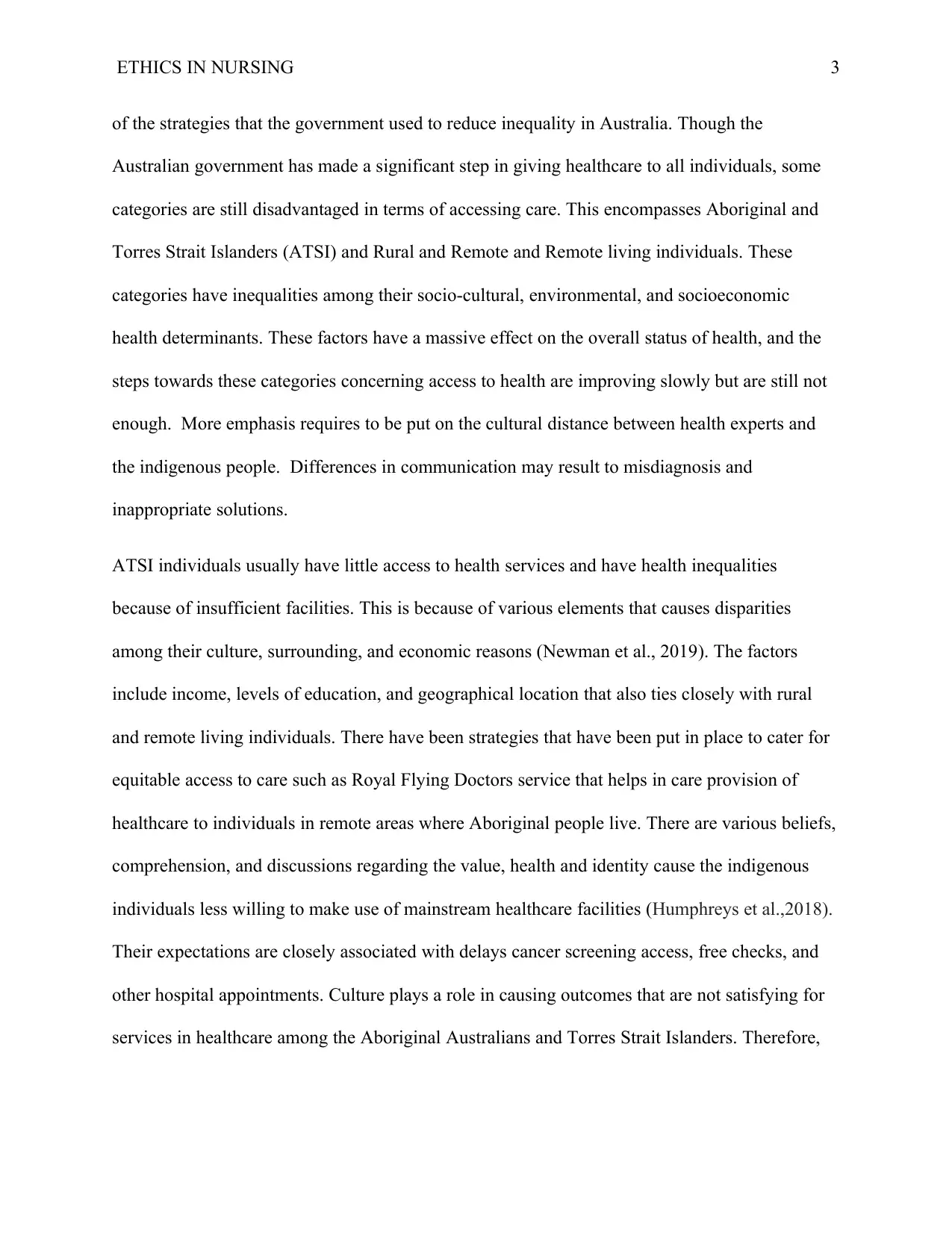
ETHICS IN NURSING 3
of the strategies that the government used to reduce inequality in Australia. Though the
Australian government has made a significant step in giving healthcare to all individuals, some
categories are still disadvantaged in terms of accessing care. This encompasses Aboriginal and
Torres Strait Islanders (ATSI) and Rural and Remote and Remote living individuals. These
categories have inequalities among their socio-cultural, environmental, and socioeconomic
health determinants. These factors have a massive effect on the overall status of health, and the
steps towards these categories concerning access to health are improving slowly but are still not
enough. More emphasis requires to be put on the cultural distance between health experts and
the indigenous people. Differences in communication may result to misdiagnosis and
inappropriate solutions.
ATSI individuals usually have little access to health services and have health inequalities
because of insufficient facilities. This is because of various elements that causes disparities
among their culture, surrounding, and economic reasons (Newman et al., 2019). The factors
include income, levels of education, and geographical location that also ties closely with rural
and remote living individuals. There have been strategies that have been put in place to cater for
equitable access to care such as Royal Flying Doctors service that helps in care provision of
healthcare to individuals in remote areas where Aboriginal people live. There are various beliefs,
comprehension, and discussions regarding the value, health and identity cause the indigenous
individuals less willing to make use of mainstream healthcare facilities (Humphreys et al.,2018).
Their expectations are closely associated with delays cancer screening access, free checks, and
other hospital appointments. Culture plays a role in causing outcomes that are not satisfying for
services in healthcare among the Aboriginal Australians and Torres Strait Islanders. Therefore,
of the strategies that the government used to reduce inequality in Australia. Though the
Australian government has made a significant step in giving healthcare to all individuals, some
categories are still disadvantaged in terms of accessing care. This encompasses Aboriginal and
Torres Strait Islanders (ATSI) and Rural and Remote and Remote living individuals. These
categories have inequalities among their socio-cultural, environmental, and socioeconomic
health determinants. These factors have a massive effect on the overall status of health, and the
steps towards these categories concerning access to health are improving slowly but are still not
enough. More emphasis requires to be put on the cultural distance between health experts and
the indigenous people. Differences in communication may result to misdiagnosis and
inappropriate solutions.
ATSI individuals usually have little access to health services and have health inequalities
because of insufficient facilities. This is because of various elements that causes disparities
among their culture, surrounding, and economic reasons (Newman et al., 2019). The factors
include income, levels of education, and geographical location that also ties closely with rural
and remote living individuals. There have been strategies that have been put in place to cater for
equitable access to care such as Royal Flying Doctors service that helps in care provision of
healthcare to individuals in remote areas where Aboriginal people live. There are various beliefs,
comprehension, and discussions regarding the value, health and identity cause the indigenous
individuals less willing to make use of mainstream healthcare facilities (Humphreys et al.,2018).
Their expectations are closely associated with delays cancer screening access, free checks, and
other hospital appointments. Culture plays a role in causing outcomes that are not satisfying for
services in healthcare among the Aboriginal Australians and Torres Strait Islanders. Therefore,
⊘ This is a preview!⊘
Do you want full access?
Subscribe today to unlock all pages.

Trusted by 1+ million students worldwide
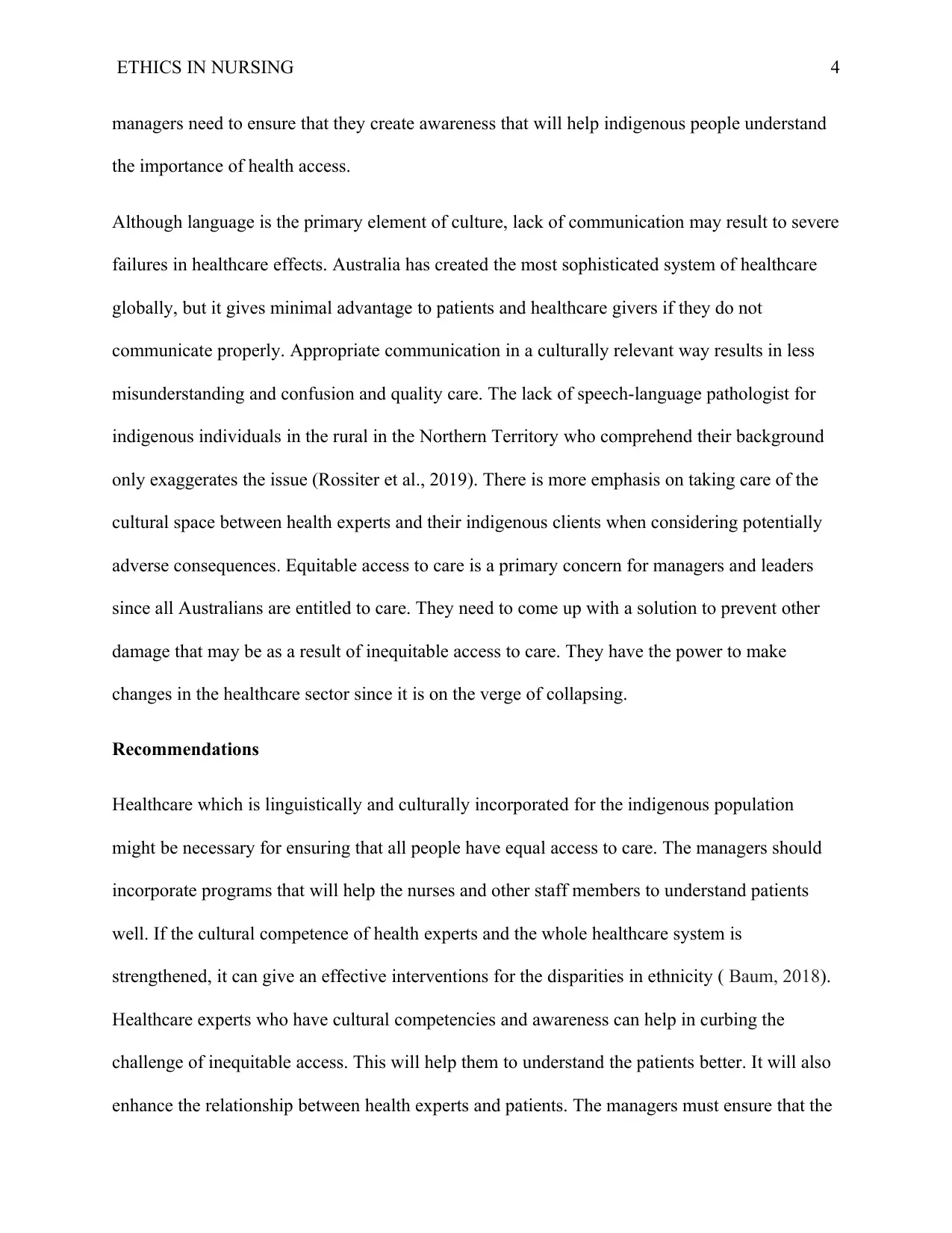
ETHICS IN NURSING 4
managers need to ensure that they create awareness that will help indigenous people understand
the importance of health access.
Although language is the primary element of culture, lack of communication may result to severe
failures in healthcare effects. Australia has created the most sophisticated system of healthcare
globally, but it gives minimal advantage to patients and healthcare givers if they do not
communicate properly. Appropriate communication in a culturally relevant way results in less
misunderstanding and confusion and quality care. The lack of speech-language pathologist for
indigenous individuals in the rural in the Northern Territory who comprehend their background
only exaggerates the issue (Rossiter et al., 2019). There is more emphasis on taking care of the
cultural space between health experts and their indigenous clients when considering potentially
adverse consequences. Equitable access to care is a primary concern for managers and leaders
since all Australians are entitled to care. They need to come up with a solution to prevent other
damage that may be as a result of inequitable access to care. They have the power to make
changes in the healthcare sector since it is on the verge of collapsing.
Recommendations
Healthcare which is linguistically and culturally incorporated for the indigenous population
might be necessary for ensuring that all people have equal access to care. The managers should
incorporate programs that will help the nurses and other staff members to understand patients
well. If the cultural competence of health experts and the whole healthcare system is
strengthened, it can give an effective interventions for the disparities in ethnicity ( Baum, 2018).
Healthcare experts who have cultural competencies and awareness can help in curbing the
challenge of inequitable access. This will help them to understand the patients better. It will also
enhance the relationship between health experts and patients. The managers must ensure that the
managers need to ensure that they create awareness that will help indigenous people understand
the importance of health access.
Although language is the primary element of culture, lack of communication may result to severe
failures in healthcare effects. Australia has created the most sophisticated system of healthcare
globally, but it gives minimal advantage to patients and healthcare givers if they do not
communicate properly. Appropriate communication in a culturally relevant way results in less
misunderstanding and confusion and quality care. The lack of speech-language pathologist for
indigenous individuals in the rural in the Northern Territory who comprehend their background
only exaggerates the issue (Rossiter et al., 2019). There is more emphasis on taking care of the
cultural space between health experts and their indigenous clients when considering potentially
adverse consequences. Equitable access to care is a primary concern for managers and leaders
since all Australians are entitled to care. They need to come up with a solution to prevent other
damage that may be as a result of inequitable access to care. They have the power to make
changes in the healthcare sector since it is on the verge of collapsing.
Recommendations
Healthcare which is linguistically and culturally incorporated for the indigenous population
might be necessary for ensuring that all people have equal access to care. The managers should
incorporate programs that will help the nurses and other staff members to understand patients
well. If the cultural competence of health experts and the whole healthcare system is
strengthened, it can give an effective interventions for the disparities in ethnicity ( Baum, 2018).
Healthcare experts who have cultural competencies and awareness can help in curbing the
challenge of inequitable access. This will help them to understand the patients better. It will also
enhance the relationship between health experts and patients. The managers must ensure that the
Paraphrase This Document
Need a fresh take? Get an instant paraphrase of this document with our AI Paraphraser
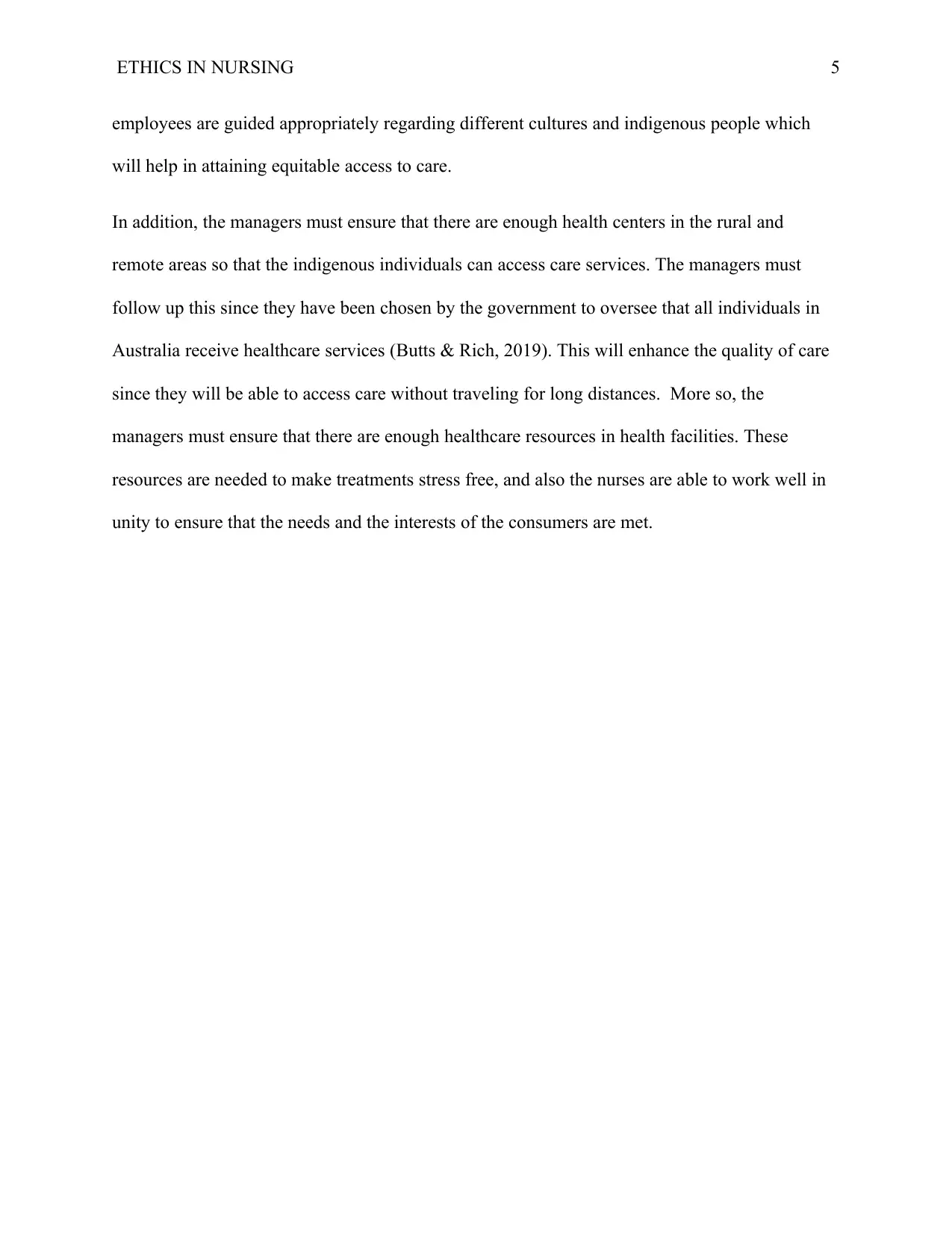
ETHICS IN NURSING 5
employees are guided appropriately regarding different cultures and indigenous people which
will help in attaining equitable access to care.
In addition, the managers must ensure that there are enough health centers in the rural and
remote areas so that the indigenous individuals can access care services. The managers must
follow up this since they have been chosen by the government to oversee that all individuals in
Australia receive healthcare services (Butts & Rich, 2019). This will enhance the quality of care
since they will be able to access care without traveling for long distances. More so, the
managers must ensure that there are enough healthcare resources in health facilities. These
resources are needed to make treatments stress free, and also the nurses are able to work well in
unity to ensure that the needs and the interests of the consumers are met.
employees are guided appropriately regarding different cultures and indigenous people which
will help in attaining equitable access to care.
In addition, the managers must ensure that there are enough health centers in the rural and
remote areas so that the indigenous individuals can access care services. The managers must
follow up this since they have been chosen by the government to oversee that all individuals in
Australia receive healthcare services (Butts & Rich, 2019). This will enhance the quality of care
since they will be able to access care without traveling for long distances. More so, the
managers must ensure that there are enough healthcare resources in health facilities. These
resources are needed to make treatments stress free, and also the nurses are able to work well in
unity to ensure that the needs and the interests of the consumers are met.
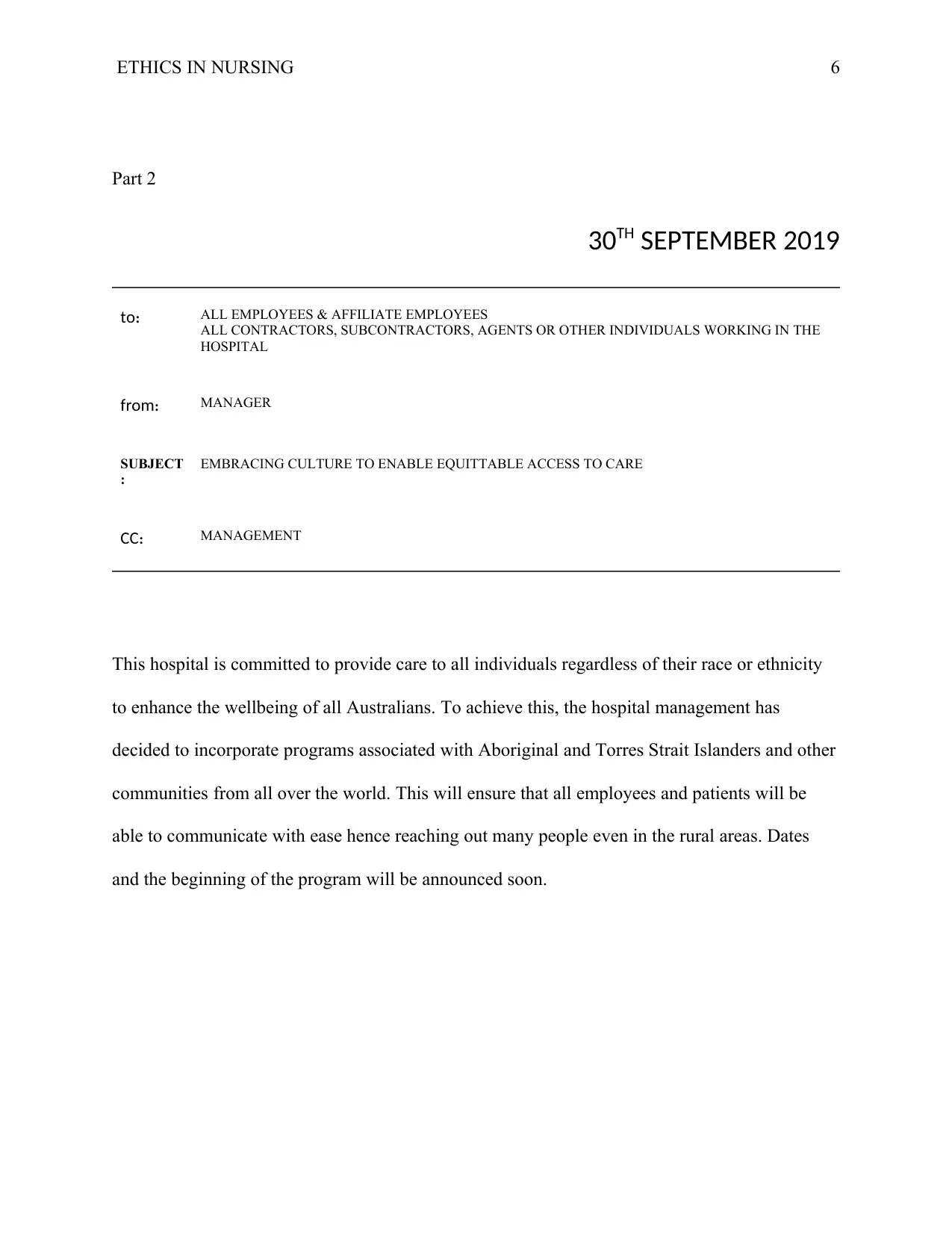
ETHICS IN NURSING 6
Part 2
30TH SEPTEMBER 2019
to: ALL EMPLOYEES & AFFILIATE EMPLOYEES
ALL CONTRACTORS, SUBCONTRACTORS, AGENTS OR OTHER INDIVIDUALS WORKING IN THE
HOSPITAL
from: MANAGER
SUBJECT
:
EMBRACING CULTURE TO ENABLE EQUITTABLE ACCESS TO CARE
CC: MANAGEMENT
This hospital is committed to provide care to all individuals regardless of their race or ethnicity
to enhance the wellbeing of all Australians. To achieve this, the hospital management has
decided to incorporate programs associated with Aboriginal and Torres Strait Islanders and other
communities from all over the world. This will ensure that all employees and patients will be
able to communicate with ease hence reaching out many people even in the rural areas. Dates
and the beginning of the program will be announced soon.
Part 2
30TH SEPTEMBER 2019
to: ALL EMPLOYEES & AFFILIATE EMPLOYEES
ALL CONTRACTORS, SUBCONTRACTORS, AGENTS OR OTHER INDIVIDUALS WORKING IN THE
HOSPITAL
from: MANAGER
SUBJECT
:
EMBRACING CULTURE TO ENABLE EQUITTABLE ACCESS TO CARE
CC: MANAGEMENT
This hospital is committed to provide care to all individuals regardless of their race or ethnicity
to enhance the wellbeing of all Australians. To achieve this, the hospital management has
decided to incorporate programs associated with Aboriginal and Torres Strait Islanders and other
communities from all over the world. This will ensure that all employees and patients will be
able to communicate with ease hence reaching out many people even in the rural areas. Dates
and the beginning of the program will be announced soon.
⊘ This is a preview!⊘
Do you want full access?
Subscribe today to unlock all pages.

Trusted by 1+ million students worldwide
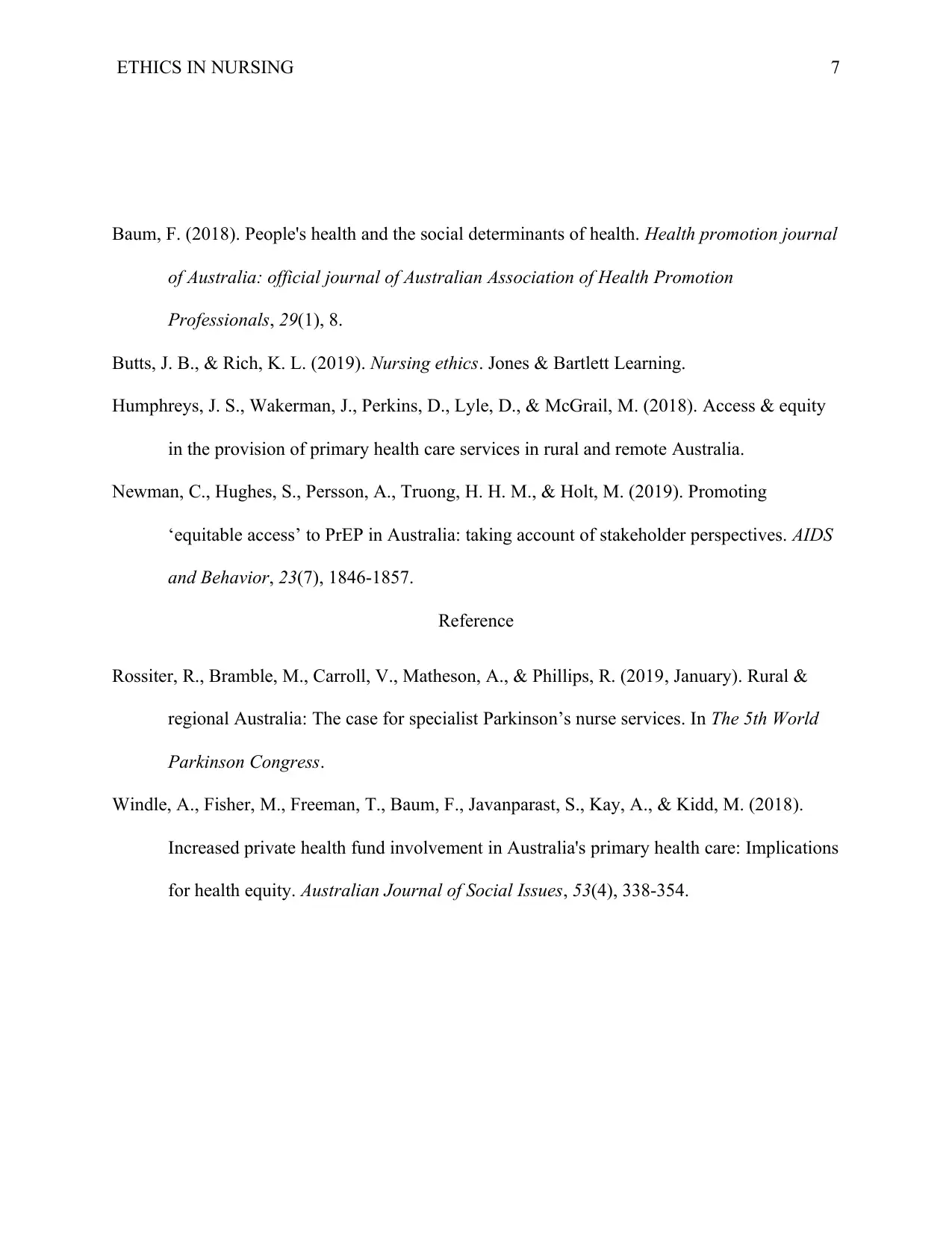
ETHICS IN NURSING 7
Baum, F. (2018). People's health and the social determinants of health. Health promotion journal
of Australia: official journal of Australian Association of Health Promotion
Professionals, 29(1), 8.
Butts, J. B., & Rich, K. L. (2019). Nursing ethics. Jones & Bartlett Learning.
Humphreys, J. S., Wakerman, J., Perkins, D., Lyle, D., & McGrail, M. (2018). Access & equity
in the provision of primary health care services in rural and remote Australia.
Newman, C., Hughes, S., Persson, A., Truong, H. H. M., & Holt, M. (2019). Promoting
‘equitable access’ to PrEP in Australia: taking account of stakeholder perspectives. AIDS
and Behavior, 23(7), 1846-1857.
Reference
Rossiter, R., Bramble, M., Carroll, V., Matheson, A., & Phillips, R. (2019, January). Rural &
regional Australia: The case for specialist Parkinson’s nurse services. In The 5th World
Parkinson Congress.
Windle, A., Fisher, M., Freeman, T., Baum, F., Javanparast, S., Kay, A., & Kidd, M. (2018).
Increased private health fund involvement in Australia's primary health care: Implications
for health equity. Australian Journal of Social Issues, 53(4), 338-354.
Baum, F. (2018). People's health and the social determinants of health. Health promotion journal
of Australia: official journal of Australian Association of Health Promotion
Professionals, 29(1), 8.
Butts, J. B., & Rich, K. L. (2019). Nursing ethics. Jones & Bartlett Learning.
Humphreys, J. S., Wakerman, J., Perkins, D., Lyle, D., & McGrail, M. (2018). Access & equity
in the provision of primary health care services in rural and remote Australia.
Newman, C., Hughes, S., Persson, A., Truong, H. H. M., & Holt, M. (2019). Promoting
‘equitable access’ to PrEP in Australia: taking account of stakeholder perspectives. AIDS
and Behavior, 23(7), 1846-1857.
Reference
Rossiter, R., Bramble, M., Carroll, V., Matheson, A., & Phillips, R. (2019, January). Rural &
regional Australia: The case for specialist Parkinson’s nurse services. In The 5th World
Parkinson Congress.
Windle, A., Fisher, M., Freeman, T., Baum, F., Javanparast, S., Kay, A., & Kidd, M. (2018).
Increased private health fund involvement in Australia's primary health care: Implications
for health equity. Australian Journal of Social Issues, 53(4), 338-354.
Paraphrase This Document
Need a fresh take? Get an instant paraphrase of this document with our AI Paraphraser

ETHICS IN NURSING 8

ETHICS IN NURSING 9
⊘ This is a preview!⊘
Do you want full access?
Subscribe today to unlock all pages.

Trusted by 1+ million students worldwide

ETHICS IN NURSING 10
1 out of 10
Related Documents
Your All-in-One AI-Powered Toolkit for Academic Success.
+13062052269
info@desklib.com
Available 24*7 on WhatsApp / Email
![[object Object]](/_next/static/media/star-bottom.7253800d.svg)
Unlock your academic potential
Copyright © 2020–2026 A2Z Services. All Rights Reserved. Developed and managed by ZUCOL.





